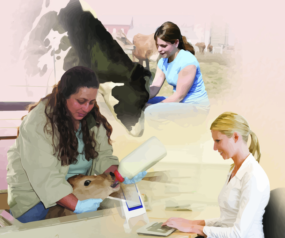To read this article in French, click here.
Recently, my mother offered a new theory on why farmers would take up an occupation that is high risk, offers a low financial reward and requires a lot of work: There’s a parasite in their brain.
Being a high school animal science teacher, she was discussing Toxoplasma gondii with her students, more commonly called toxo. Those in agriculture, particularly sheep farmers, will be familiar with the parasite, as it is one of the leading causes of abortion in livestock. Pregnant women are often warned to stay away from cats for the same reason, as the parasite is shed in cat feces. Distantly related to malaria, T. gondii can only reproduce in the gut of felines, both domestic and wild. How it gets there is impressively clever.
The protozoan parasite can infect all warm-blooded species, remaining inside them for years. Transmission occurs from being in contact with feline feces, drinking contaminated water or ingesting meat that carries the parasite. In order to return to its desired environment, T. gondii affects the brain of the host and encourages the host to engage in more risky behavior – which hopefully gets it eaten by a cat of some sorts.
Scientists have observed that mice infected with toxo are less likely to be afraid of cats and the scent of their urine and are sometimes even attracted to the smell. Additionally, the parasite also affects the behavior of wildlife. Researchers have always wondered what drives certain wolves to go out on their own or to fight to become leader of their pack. Kira Cassidy and the Yellowstone Wolf Project recorded how wolves that share a habitat with cougars are more prone to be infected with toxo, and those infected are 11-times more likely to leave the pack and 46-times more likely to become leader of the pack than uninfected wolves. Other research has determined that chimpanzees infected with toxo are attracted to the urine of leopards, their natural enemy, and spotted hyena cubs with the parasite are more likely to approach lions.
Nature is dealing with a clever parasite, and one that is widespread. It is estimated that 40% of warm-blooded animals in the world are infected with toxo.
Still much is unknown regarding how T. gondii operates, but in 2009, U.K. researchers discovered that the protozoa attaches to white blood cells – the cells that are supposed to kill them – and uses them to produce neurotransmitters that block or reduce fear responses. Scientists noticed GABA, a neurotransmitter that is associated with schizophrenia, in the immune system of infected hosts – where it shouldn’t be. It seems the parasite produces GABA to “get a lift” to the brain in Trojan-horse style, where it can affect the behavior of the host.
Does this crafty parasite change the way people behave? The answer, it turns out, is yes. Czech evolutionary biologist Jaroslav Flegr has discovered that T. gondii is controlling our brains too.
In 1990 he was diagnosed with toxo, after which he noticed he experienced less sensations of fear. He realized he was doing things like crossing the street more casually and not jumping when cars honked at him. It was already known that the parasite can be found in up to a third of the human population at any one time, although most people with a healthy immune system would likely be unaware of it. However, recent studies suggest that toxo is responsible for increasing risky behavior in people as well, as Flegr observed. Individuals infected with toxo are more likely to die in a car accident due to dangerous driving, but at the same time are more likely to become entrepreneurs and start their own businesses, being less inhibited by the fear of failure. It may be interesting to research how many world leaders are currently infected.
After reading about it, I find it startling how much can be explained by toxo when I stop and think about it. A friend in Berlin we call Drama John was known for getting into bar fights, mocking police to their face, and once, stealing a taxi and driving it around all night. We weren’t sure where such behavior would lead, but we knew it wouldn’t be good. Then, we were shocked when we found out about his most outrageous move yet: He bought two sphynx kittens for $1,200 each. At the time, we couldn’t believe it. Now, however, it all makes sense.
In the same way, many people have looked at farmers and wondered what keeps them going. With volatile milk prices and the high costs of feed and fuel, it’s a precarious venture that doesn’t seem logical from the outside looking in. How often have we heard one farmer muse to another that they must be crazy to farm? How many jokes involve all the money a farmer doesn’t make or all the more-fun ways they could lose it instead? At its worst, farming is a behavior that defies rational judgment.
And running around on all of these farms are barn cats. I hate to admit it, but perhaps my mother might have a point.






